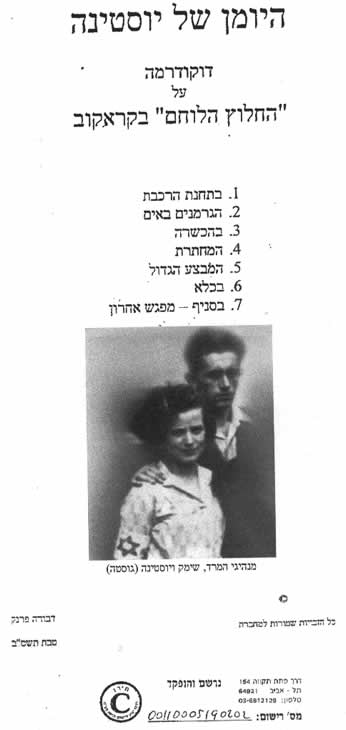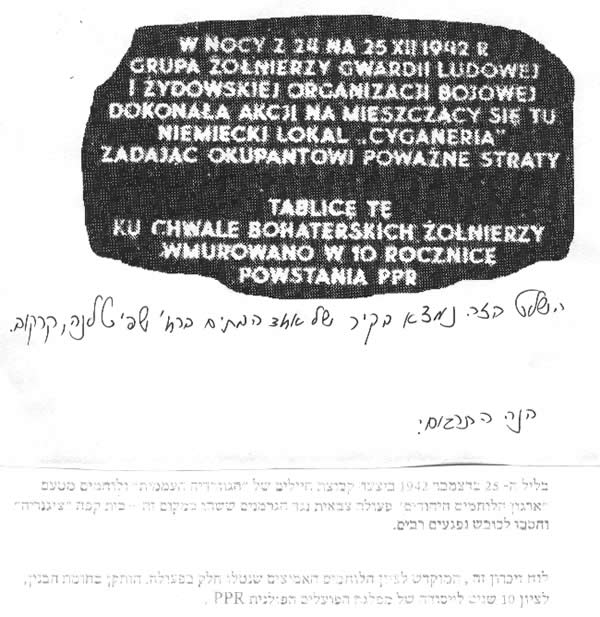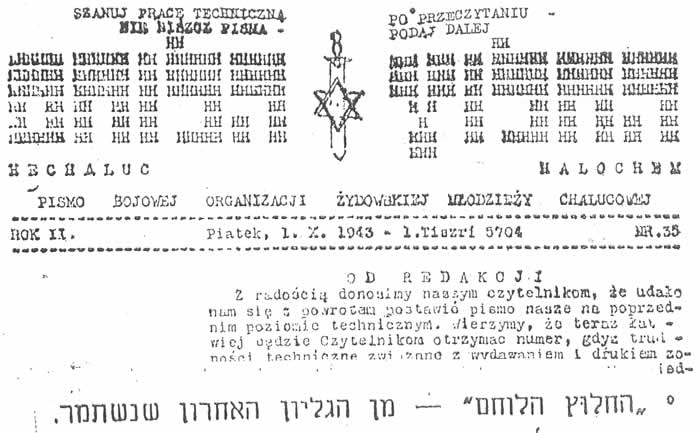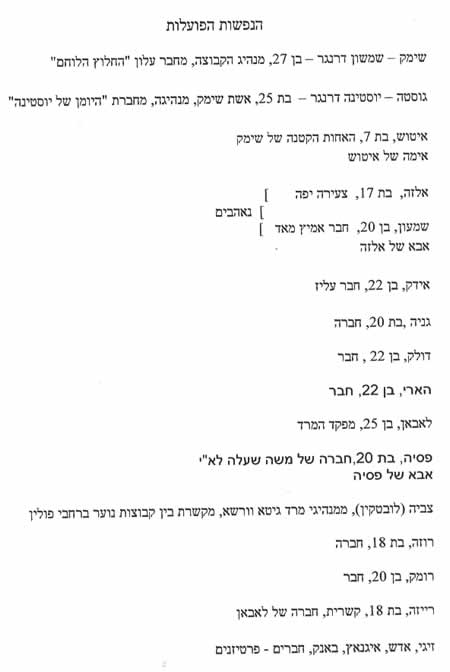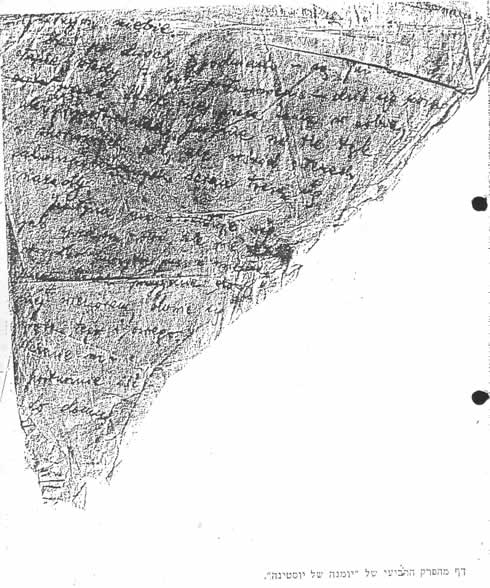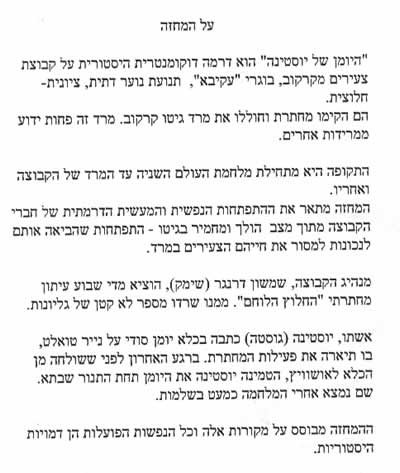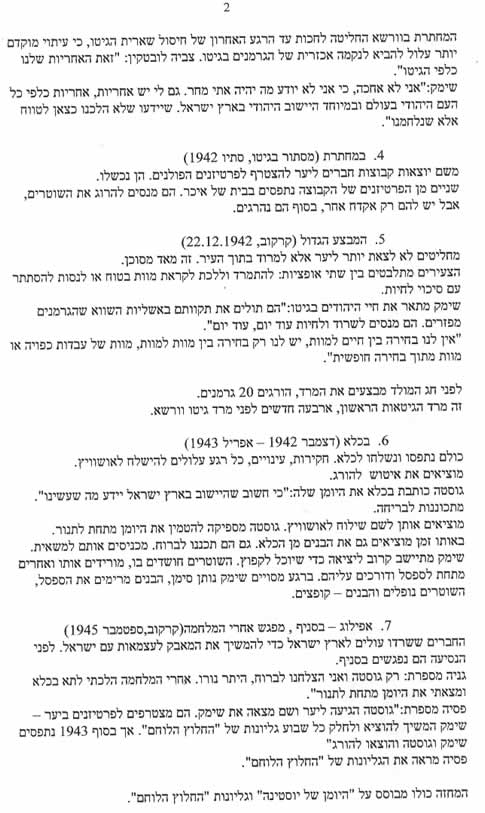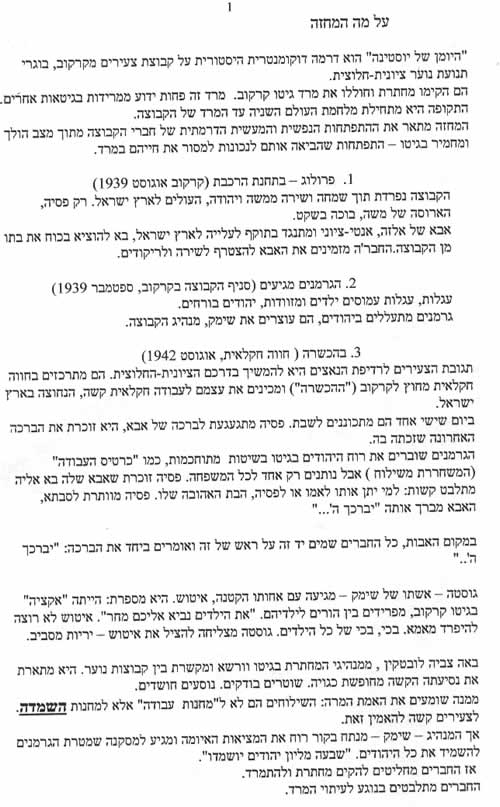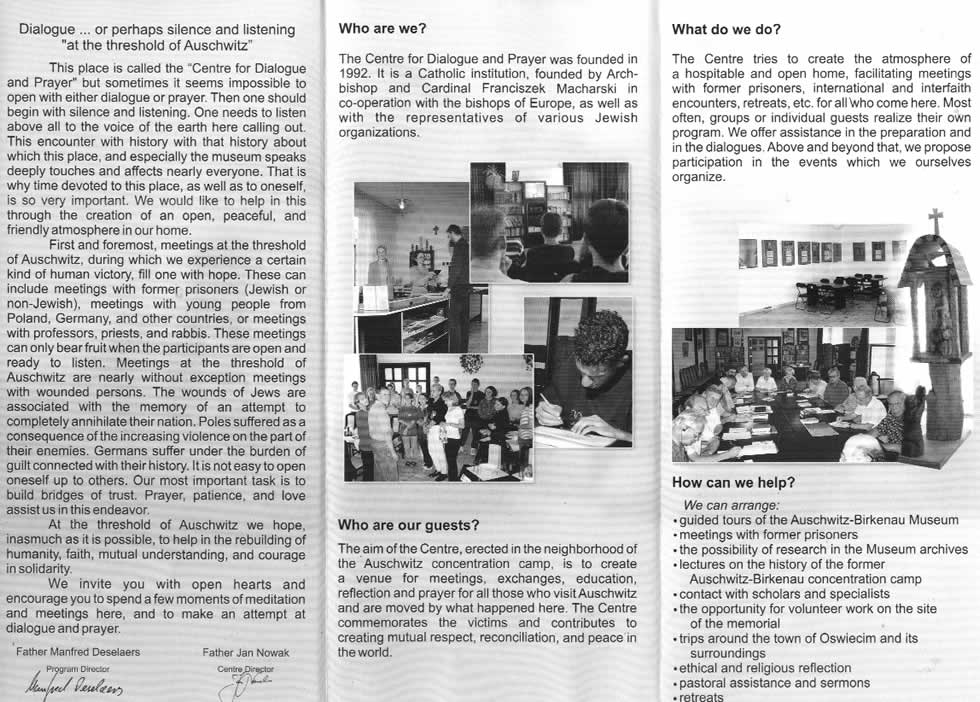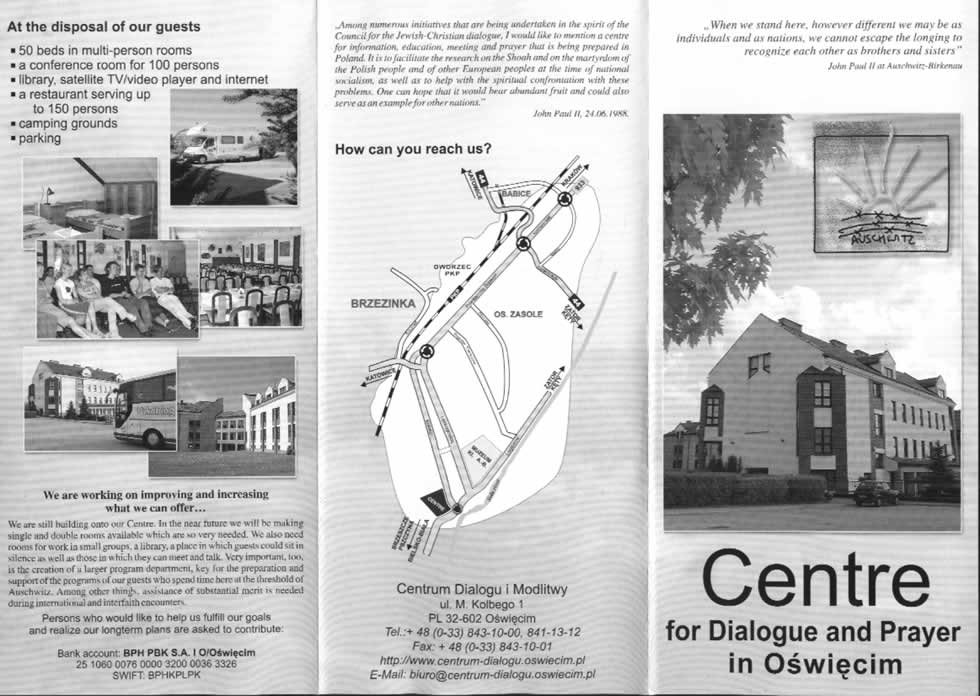http://www.israel-interfaith.co.il/
Arabs and Jews speak about Auschwitz
Dear Friends,
During the last months our association studied the subject of
the „Holocaust from the Arab point of view“. Our
first seminar on the subject took place on 30th of October 2002,
(a report on it you will find on the website under 2002
l) even before we heard about the new Israeli-Arab initiative
to visit Auschwitz. After we heard about it, we invited the
initiators to a seminar in Jerusalem together with the Konrad
Adenauer foundation. The report on it you will find here. The
Association plans to continue the study of the subject on the
return of the group from Auschwitz by way of additional seminars
and meetings.
The report:
Arabs and Jews speak about Auschwitz
In spite of the tense situation in Israel and the great concern
of a possible attack by Saddam Hussein on Israel following the
American-Brittish invasion of Irak, about 250 people responded
on Thursday evening, the 20th of March, the first day of the
War, to the invitation of the Israel Interfaith Association
and the Konrad Adenauer Foundation and attended at the Konrad
Adenauer Congress Center in Jerusalem a seminar on the subject:
„From Commemoration to Peace - an Arab Iniative - towards
the joint visit of Jews and Arabs to Auschwitz“. The Archimandrite
Emile Shoufani, the schoolmaster of St Joseph College in Nazareth
and the initiator of the visit, the Social Psychologist Ruth
Bar Shalev and the chairman of the International Auschwitz Committee,
Noach Flug, addressed the meeting.
The Director of the Konrad Adenauer Foundation in Israel, Dr.
Johannes Gerster, welcomed the Arab initiative and promised
the project financial support. The moderator of the evening,
David Witzthum from the Israel Television, emphasized the innovative
character of this initiative. So far Auschwitz was considered
a place of separation between Jews and Christians which demonstrated
the great gap between them, the Arab initiative was meant to
make it into a starting point for an encounter of Jews and Arabs,
a bridge of peace between the two nations.
Archimandrite Shoufani explained what the symbol
of Auschwitz meant for him. Auschwitz was the place of death.
In order to reach a life together between the two people, the
Israelis and the Palestinians, it is necessary to pass in this
place of death. This passage will open the way for bridging
the conflict, the gap between them. For Jews also it will be
possible to accept the Palestinian suffering when they will
share with them the suffering of Auschwitz. He mentioned, that
his school in Nazareth, the St. Joseph College, has an exchange
program for 13 years with the Jewish High School adjacent to
the Hebrew University. During these many years of cooperation
everything was discussed by the parents and pupils, politics,
religion, human relations of Jews and Arabs, but not one word
was said about Auschwitz and its significance.
Since October 2000, since the beginning of the El Aksa Intifada,
in which 13 Arabs from Nazareth and surroundings lost their
lives, the mutual visits of Arab pupils in Jerusalem , their
reception in Jewish houses and of Jewish pupils in Nazareth
and their stay there overnight at their Arab friends stopped.
The fear of the parents from both sides was too great. Now after
the teachers of the Jewish school told the parents about the
initiative, Jewish pupils again came for the first time to Nazareth
and spent the night there, and instead of the normal number
of twenty, thirty pupils a hundred came.
Ruth Bar Shalev, who is responsible for the Jewish participants
of the trip, spoke about the necessary change, which has to
happen also among the Jewish participants in order to achieve
peace. Noah Flug, the last speaker, welcomed the Arab initiative
wholeheartedly on behalf of the survivors. The most important
lesson of Auschwitz is, that the human honour should be respected,
unspoiled. That is also important for the present, here in Israel,
for the life together of Jews and Arabs. The Israeli Arabs can
be a bridge to the Arab world, a new beginning in the relations
between all Jews and Arabs.
The travel list of 150 Jews and 150 Arabs is full. Most Arabs
are Moslems, as is the population of Israel. There is a long
waiting list. 150 Jews, Christians and Moslems from France will
arrive in Auschwitz from Paris. The interest of the media in
this trip, which will take place between the 25th of May and
the 29th, is very great.
In the discussion that followed the introductory lectures the
hope was expressed that the peace initiative will overcome all
the difficulties of the times and the dangers, especially the
war with Irak and will cause a real breakthrough to peace in
the area.
Arabs and Jews Undertake Pilgrimage of Reconciliation to Auschwitz
Interview with Father Shoufani of Nazareth, Organizer of the
Initiative
|
NAZARETH, Israel,
MAY 26, 2003 (ZENIT.org-Avvenire).- At the initiative of a priest
from Nazareth, Arabs and Jews set out to visit Auschwitz in
order to remember the Holocaust and to promote the reconciliation
of the two peoples.
Three months ago, when Father Emile Shoufani,
the parish priest of the Greek-Melkite Catholic community, launched
the initiative, he thought some 300 would join. In fact, 125
Israeli Arabs, 25 Christians, 100 Muslims and 135 Jews have
agreed to participate in the four-day pilgrimage, which began
today.
They have been joined by 200 Frenchmen and Belgians,
140 of whom are Arabs (half Christians and half Muslims), as
well as 100 journalists.
In addition to visiting Auschwitz, in Poland,
the pilgrims will also go to Wadowice, birthplace of John Paul
II "whose teaching and commitment to reconciliation between
Arabs and Jews has inspired me," Father Shoufani explained.
The priest is of Palestinian background but Israeli citizenship,
and is archimandrite of the Melkite Church of Galilee.
Q: How did the idea arise for such a bold project?
Father Shoufani: The idea of the project "Memoria
for Peace," of a joint pilgrimage of Arabs and Jews to
Auschwitz, came to me during several meetings we had with students
and professors in the Catholic school of which I am director.
They had become increasingly difficult since the
beginning of the second intifada, which has caused an almost
total break between Israelis and Palestinians. I realized that,
in order to continue the dialogue, it was perhaps necessary
to try to make peace with history.
Q: How did your personal knowledge of the Holocaust
come about?
Father Shoufani: I learned about the Holocaust
when I was studying in France, through a book on Treblinka,
which appeared in 1966. It was the first time I read about it
and I realized that the Holocaust was not simply a page of history,
but really the annihilation of a people.
That same year I visited the Dachau concentration
camp: I was so overcome, to the point of not being able to continue
my trip. I experienced the profound misery of man and of humanity.
I am convinced that to understand the Jewish people, it is necessary
to hear what they say about their history and about the Holocaust.
Q: What was the reaction of Jews and Arabs when
you told them about the project Memoria for Peace?
Father Shoufani: When telling Jewish friends about
the project, I discovered certain reservations -- they were
sure that I would meet with the firm opposition of the Arabs.
It was necessary to overcome this attitude, to
hear this reaction. Now, dozens of Israeli Jews have agreed
to talk about the Holocaust. People of all social classes, of
the left, men and women, religious and nonreligious.
As regards the Arabs, there has been the same
acceptance, as the appeal I made has become an initiative of
the Arab community. Many people wished to participate in the
preparatory meetings.
Q: The initiative has been carefully prepared
with conferences in which Arabs and Jews have participated.
Why?
Father Shoufani: Not only did we want to visit
symbolic places, such as Auschwitz, but we wanted to know more
about the genocide, about the extermination of the Jewish people
by Nazism. The place is very important, but it is also important
to prepare oneself before going, to listen to people who know
and who lived at that time.
Many say they know what happened, but there are
many people who have never heard talk about the Shoah [Holocaust].
They don't know what it was, how it is present today in the
thinking of the Jewish world. It was a necessary preparation
that has brought understanding and awareness as a consequence.
Q: In one of those preparatory meetings, a young
Palestinian said: "I am not interested in the sufferings
the Jews were subjected to 50 years ago; I now have my own."
Father Shoufani: Too many judgments are expressed
today; easy comparisons are made of all sufferings.
Of course there is the reality of suffering. We
are all wounded, humiliated. That is, all the peoples of this
region, Palestinians and Israelis, Hebrews and Arabs, we have
a very deep wound.
But I answer: We cannot compare histories marked
by suffering; instead, it is necessary to listen to and assume
the suffering of the other. Our initiative consists of listening
to the Jewish suffering, of becoming aware: conscious of carrying
out a gesture that does not call for anything in return. I see
it as a liberating act.
Q: Have you found this openness in the Muslims
of Nazareth?
Father Shoufani: Those who have supported the
initiative are an image of the whole of Arab-Israeli society,
which is Muslim in the majority. The objective of this initiative
also consists in showing that the Israeli Arabs have never wanted
to threaten the state of Israel. Some dozens of people, a percentage
I cannot quantify, has different ideas, but the desire of the
Israeli Arabs is to be Israeli citizens, to build a new trust.
|

